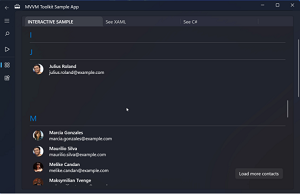News
.NET Community Toolkit v8.0 Preview 3 Tweaks MVVM Source Generators
Microsoft shipped .NET Community Toolkit v8.0 Preview 3 as part of its effort to coalesce all of its general .NET libraries into a one-stop-shop resource.
That resource is the .NET Community Toolkit repo on GitHub, a collection of platform-agnostic helpers and APIs that work for all .NET developers -- maintained and published by Microsoft -- that's part of the .NET Foundation. Its offerings that come via NuGet include successors to the old Windows Community Toolkit and MvvmLlight along with others, with the full gamut being:
- CommunityToolkit.Mvvm (aka MVVM Toolkit): a fast, modular, platform-agnostic MVVM library, which is the official successor of MvvmLight. It's used extensively in the Microsoft Store and other first party apps.
- CommunityToolkit.Mvvm.SourceGenerators: the source generators to augment the MVVM Toolkit.
- CommunityToolkit.Diagnostics: a set of helper APIs (specifically, Guard and ThrowHelper) that can be used for cleaner, more efficient and less error-prone argument validation and error checking.
- CommunityToolkit.HighPerformance a collection of helpers for working in high-performance scenarios. It includes APIs such as pooled buffer helpers, a fast string pool type, a 2D variant of Memory and Span (Memory2D<T> and Span2D<T>) also supporting discontiguous regions, helpers for bit shift operations (such as BitHelper, also used in Paint.NET), and more.
- CommunityToolkit.Common: a set of helper APIs shared with other CommunityToolkit libraries.
It's that first item, the MVVM Toolkit, that sees several tweaks in Preview 3.
 [Click on image for larger, animated GIF view.] An interactive grouped collection of contacts using the MVVM Toolkit collection APIs (source: Microsoft).
[Click on image for larger, animated GIF view.] An interactive grouped collection of contacts using the MVVM Toolkit collection APIs (source: Microsoft).
For example, one improvement to the MVMM Toolkit revamps observable grouped collections, whose functionality is depicted in the animated graphic above.
However, many changes in Preview 3 concern the second item, source generators, a C# compiler feature that lets C# developers inspect user code as it is being compiled and generates new C# source files on the fly that are added to the user's compilation.
Source generator APIs reduce needed boilerplate code when working with MVVM, providing helpers such as observable properties, commands and much more.
MVVM Toolkit source generator tweaks added since Preview 1 in January include:
- Partial property changed methods: "When using
[ObservableProperty] to generate observable properties, the MVVM Toolkit will now also generate two partial methods with no implementations: On<PROPERTY_NAME>Changing and On<PROPERTY_NAME>Changed. These methods can be used to inject additional logic when a property is changed, without the need to fallback to using a manual property."
- Cancellation support for commands: "A new property has been added to the
[ICommand] attribute, which can be used to instruct the source generator to generate a cancel command alongside the original command. This cancel command can be used to cancel the execution of an asynchronous command."
- Broadcast change support for generated properties: "We've also added a new
[AlsoBroadcastChange] attribute which can be used on generated observable property from a type that inherits from ObservableRecipient (or that is annotated with [ObservableRecipient]). Using it will generate a call to the Broadcast method, to send a message to all other subscribed component about the property change that just happened. This can be useful in scenarios where a property change from a viewmodel needs to also be notified to other components in the application."
More details on all of the above and many other new features, improvements and changes -- including breaking changes -- can be found in the changelog and announcement post.
About the Author
David Ramel is an editor and writer at Converge 360.